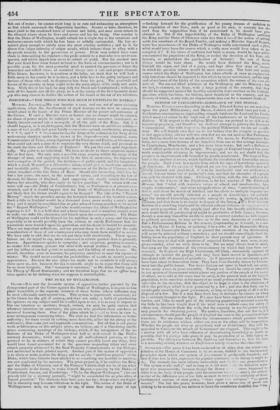THE DUKE OF WELLINGTON.
CLORE—It is now the favourite system of opposition tactics pursued by the disappointed part of the Tories against the Duke of Wellington, to impute to him plans formidable to the separate interests of those bodies whose influence may be most effectually used against him. This system is ingeniously conceived; for as his Grace has the gift of secrecy, and does not make a habit of proclaiming his opinions on any subject until he is called upon to act, it is as easy to impute to him one intention as another; though, indeed, we may be quite certain that whatever intentions he entertains, the persons who proclaim them can have no means of knowing them. One of the plans which he is ssid to have in view is, sonic arrangement concerning tithes. We wish we had this information on better authority ; for there would be nothing more desirable, either for the clergy or the cultivators, than some just and equitable commutation. But all that is not guess- work or fabrication on this subject arises, we believe, out of a blundering intelli- gence concerning meetings of the bishops, which, if the interpreters of the in- tentions of the Duke of Wellington were half as well versed in the Parlia- mentary documents, which are open to all well-informed persons, as they pretend to be in matters of which they cannot possibly know any thing, they would have found accounted for in the questions respecting tithes and other church property addressed by the Real Property Commissioners to the Bishops, and mentioned in their printed report. Another part of the system of opposition is to alarm or make jealous the King; and we see the "ambitious projects" of the Duke, which have hitherto been alluded to as something too horrible to mention, are now explained by his accusers. The great project is, if he outlives the King and the Duke of Clarence, and if the Princess Victoria shall not be of age when she succeeds to the throne, to make himself Regent,—passing by the Dukes of Cumberland, Sussex, and Cambridge. "To be the Regent Wellington " (we arc gravely told by a morning, journal), " might be considered the etc plus ultra of human grandeur." The alarmists have here gone too far ; things which are fright- ful in obscurity may become ridiculous in the light. The notion of the Duke of Wellington--a man, we are sorry to say, of more than sixty years of age
—looking forward for the gratification of his young dreams of ambition to the expiration of two lives, each as good as his own, is scarcely less ab- surd than the supposition that, if he entertained it, he should have pro- claimed it. But if the improbability of the Duke of Wellington outliving the King and the Duke of Clarence were less than it is—if the notion of setting aside the members of the Royal Family, and making a Minister himself Regent, were less monstrous—if the Duke of Wellington really entertained such a plan, what would have been the course which a crafty man would have taken to ac- complish it ? If his views of ambition had been so mean, would he have either encountered the prejudices of the King, or cooled the devotion of his Tory ad- herents, or undertaken the pacification of Ireland ? No one of these things would he have done. He would have flattered the King, made himself the organ and idol of a party, and kept alive that state of danger in which his peculiar talents would be most necessary. The bold and manly course which the Duke of Wellington has taken affords at once an explanation why intentions should be imputed to hiinwhich he never entertained, and the only sort of evidence of the falsity of the accusation which the nature of the case ;W- illits of. \Ve are not blind admirers of the Wellington and his Ministry ; but we feel, in common, we hope, with a large portion of the country, that they should be supported against the hostility excited by their conduct on the Catholic question, which has been, we believe, most beneficial to the country, and the honesty of which, at any rate, no dispassionate man can for a moment doubt of.


















 Previous page
Previous page